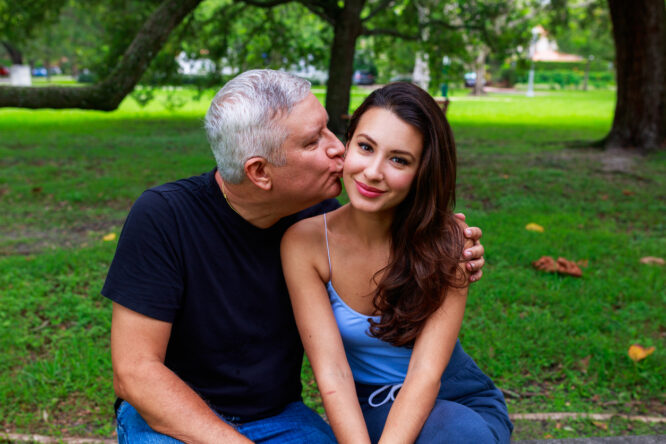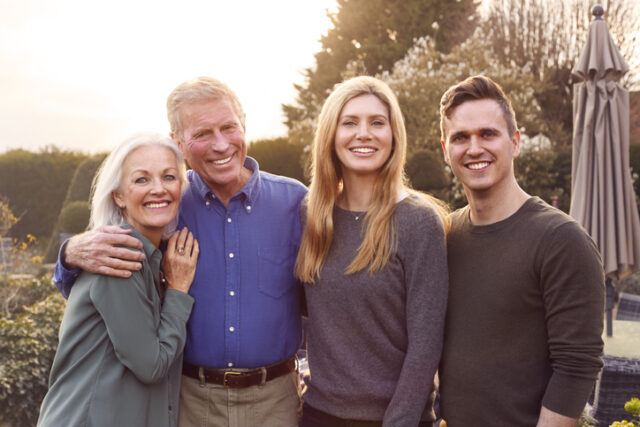Growing up with an overprotective father can shape how a woman moves through the world once she grows up.

This is especially true in regard to relationships, independence, and emotional safety. The intentions might’ve come from love, but the impact often hangs around in unexpected (and not entirely healthy) ways. Here are the behaviours that can show up later in life as a result.
1. She second-guesses herself even when she knows what she wants.

When you grow up being constantly guided, corrected, or told what’s safe and what’s not, it becomes hard to fully trust your own decisions. Even in adulthood, that internal voice can sound a lot like doubt. She might know exactly what she wants, but then talk herself out of it, hesitate, or ask for permission in subtle ways. It’s not because she lacks capability. It’s because she was raised to rely on someone else’s judgement before her own.
2. She struggles with taking healthy risks.

Overprotective parenting often turns everyday life into a caution zone. That message of “be careful” gets internalised to the point where any kind of risk, even exciting or growth-driven ones, feels threatening. She might avoid new opportunities, relationships, or changes that other people would take in stride. Not because she doesn’t want more for herself—but because she’s been trained to expect danger behind anything unfamiliar.
3. She feels guilty when she prioritises herself.

Overprotective fathers often made sacrifices, set strict rules “for her own good,” and expected gratitude in return. As a result, she may feel like focusing on her own needs now is somehow selfish or wrong. Even basic self-care can feel like rebellion. She might over-explain her decisions or downplay her wants, just to avoid feeling like she’s letting someone down. That guilt doesn’t always make sense, but it’s deeply rooted.
4. She’s hyper-aware of how other people see her choices.

When you grow up being closely watched and judged for everything from clothing to friends to where you go, it sticks. She may carry a sense that her life is always being evaluated, even by people who aren’t paying attention. This can show up as people-pleasing, perfectionism, or indecision. She’s not trying to be passive; it’s just hard to tune out that internalised feeling that someone’s always waiting to disapprove.
5. She overexplains herself in relationships.
 Source: Unsplash
Source: Unsplash An overprotective dad might’ve asked a lot of questions growing up—where are you going, who are you with, why are you doing that? Even if it came from care, it sent the message that she always needed a reason for her actions. Now, she might overexplain things to her partner, friends, or even strangers—just to avoid being misunderstood or “in trouble.” It’s not about insecurity. It’s about unlearning a dynamic where being questioned was the norm.
6. She hesitates to speak up when something feels off.

Having a protective parent can sometimes mean growing up in a world where the father’s voice held the most weight. It wasn’t always easy to push back or express discomfort without it being dismissed. So in adulthood, she might downplay her instincts or stay quiet in situations that feel wrong. Speaking up doesn’t always feel natural—it feels risky, like she might be overreacting or misunderstood again.
7. She finds independence exciting but also scary.

On one hand, she craves her own space, her own choices, her own life. On the other hand, being independent can feel unfamiliar, like there’s no one to double-check things or make sure she’s safe anymore. That tug-of-war between wanting freedom and fearing what it brings is a direct result of being raised with constant protection. She’s capable, yes, but sometimes she needs reassurance that she’s allowed to be fully in charge of her life now.
8. She avoids conflict, even when it matters.

If speaking up or challenging authority as a child was discouraged or shut down, she may carry that same dynamic into adult relationships. Conflict feels unsafe, not because she can’t handle it, but because she was taught to keep the peace at all costs. That means she might swallow frustration, keep quiet when hurt, or avoid hard conversations. Not because she lacks strength, but because silence was often safer than standing her ground.
9. She questions whether she’s allowed to be angry.

Many overprotective fathers encouraged their daughters to be kind, polite, and agreeable—but didn’t create space for healthy anger or boundaries. So now, anger feels foreign or even wrong. She might internalise frustration, cry instead of getting mad, or blame herself for feeling upset at all. It’s not that she doesn’t feel things deeply. It’s that she was never shown how to express those feelings without fear of judgement or shutdown.
10. She seeks reassurance more often than she’d like.

Having a parent who constantly monitored her decisions can leave her unsure whether she’s doing things “right.” So she checks in—asks for opinions, double-checks her instincts, and looks for signs she’s on the right track. It’s not about being needy; it’s about needing to rebuild the kind of inner voice that says, “You’ve got this.” Because that confidence wasn’t always nurtured in the way it should’ve been.
11. She sometimes doubts she knows what love should feel like.

If her father was protective but emotionally distant or critical, love may have come with strings, rules, or control. That can make it hard to recognise healthy love when it shows up in adulthood. She might confuse comfort with boredom, or mistake intensity for connection. That early model of love shapes everything, and it can take time—and self-trust—to sort through what’s healthy versus what just feels familiar.
12. She often tries to predict problems before they happen.

Being raised by someone who always warned her about worst-case scenarios can create a habit of scanning for danger, even when life is fine. She might plan too far ahead or assume something’s about to go wrong. That mindset isn’t rooted in pessimism; it’s a protective mechanism. It makes her feel like she’s being responsible. But it also keeps her from relaxing into the present without mentally bracing for impact.
13. She’s fiercely loyal, but often to her own detriment.

Overprotective fathers sometimes raised daughters to value loyalty and trust above all else. While that can make her an incredibly devoted partner or friend, it also means she might stay in situations that no longer serve her. Walking away can feel like betrayal, even when she knows she’s not being treated right. That sense of obligation runs deep, and learning to put her own well-being first can feel like rewriting the rules.
14. She’s harder on herself than anyone else ever could be.

When you grow up trying to meet strict expectations, it’s easy to internalise the pressure. She might push herself relentlessly, downplay her wins, or feel like she’s constantly falling short, even when she’s doing more than enough, that self-criticism often started as a way to avoid disappointing someone else. Now, it’s a voice she has to work hard to quiet. The journey isn’t about becoming perfect—it’s about learning that she’s already enough without having to prove it constantly.




